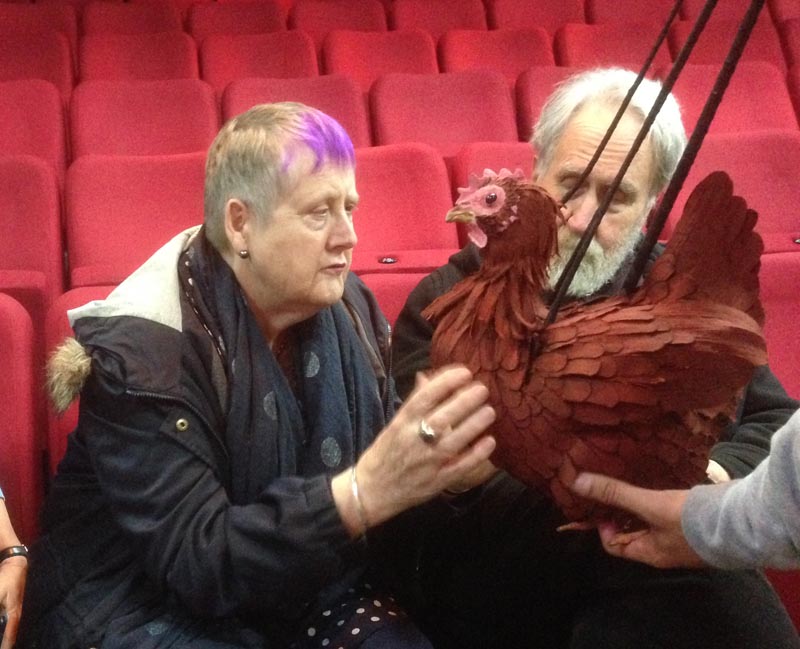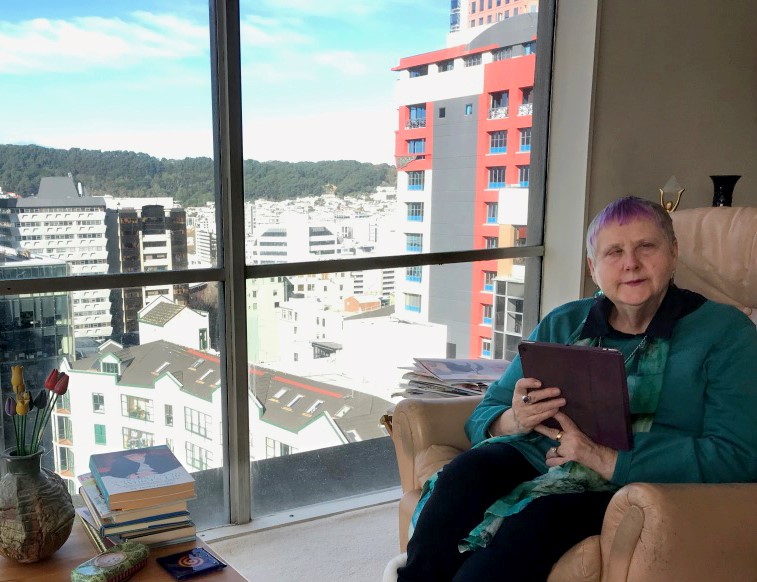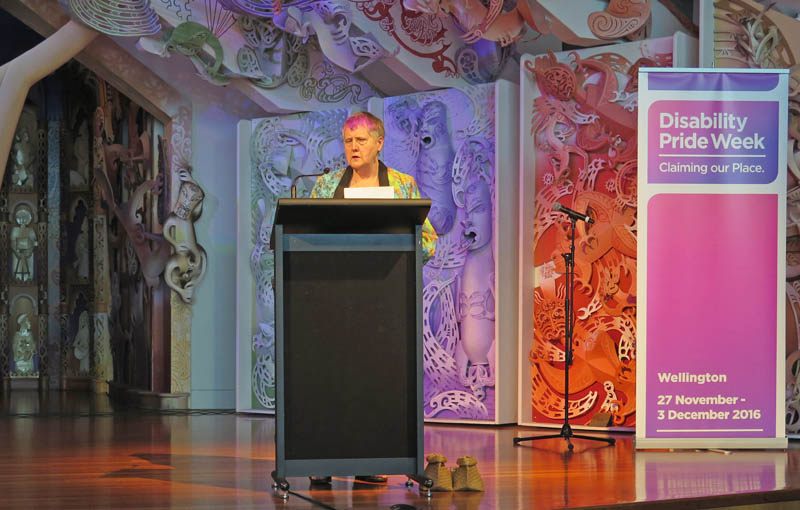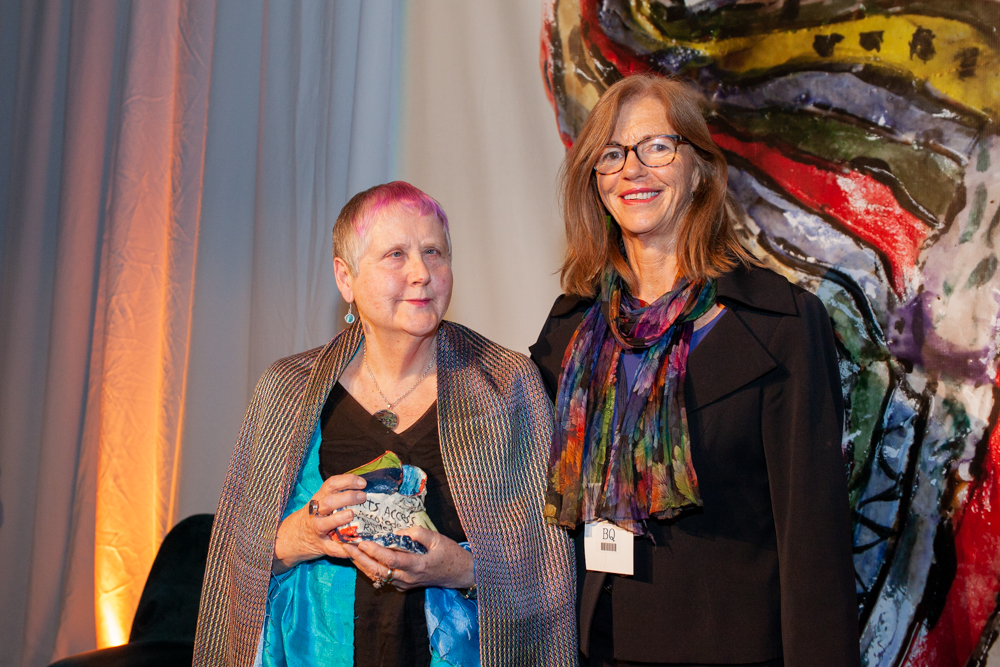Robyn Hunt: fighting for human rights
By Penny Griffith
“I can’t stand injustice and I can’t stand discrimination. It’s something you can’t just turn on and off. Once you know about it you have to keep on fighting to make things right,” says Robyn Hunt, recipient of the Arts Access Accolade 2019.
The Accolade, presented to Robyn at Te Putanga Toi Arts Access Awards 2019, recognises the Wellingtonian’s long-standing commitment to human rights and advocacy for disabled people. It also recognises her unstinting support for Arts Access Aotearoa’s work.
 Unlike the other award recipients, selected by a judging panel, the Arts Access Accolade is chosen by Arts Access Aotearoa’s staff and board. Executive Director Richard Benge says that over many years, Robyn has been an invaluable sounding board for Arts Access Aotearoa.
Unlike the other award recipients, selected by a judging panel, the Arts Access Accolade is chosen by Arts Access Aotearoa’s staff and board. Executive Director Richard Benge says that over many years, Robyn has been an invaluable sounding board for Arts Access Aotearoa.
“We deeply appreciate Robyn’s wisdom and generosity in guiding Arts Access Aotearoa’s mahi,” he says. “Having Robyn on your team means expert advice and action. As a former Human Rights Commissioner, she epitomises the core belief of Arts Access Aotearoa – that access to the arts is a human right.”
Robyn was born with cataracts and had eye operations when she was two-years-old. Since then, she has lived with low vision.
At her home overlooking Wellington’s harbour and cityscape, she reminisces: “My tūrangawaewae is a little place called Hororata on the Canterbury Plains and I was very lucky that my new entrance teacher taught me to read. Of course, it wasn’t easy but literacy was the best gift I was given.”
 Robyn picks up her battered iPad, her constant companion. She downloads her books from the OverDrive website and needs no special equipment except a large computer screen with enlargement settings.
Robyn picks up her battered iPad, her constant companion. She downloads her books from the OverDrive website and needs no special equipment except a large computer screen with enlargement settings.
“I have loved books ever since. I can’t get enough of them. My favourites? Murders!”
Growing up, she says her family accepted her disability but they struggled at times. “There was absolutely no support for my parents.”
She had a happy childhood until she went to boarding school in Christchurch, where she was bullied as a disabled person. From there, she attended Canterbury University and in 1970, she gained a degree in political science and English.
“I had become very interested in civil rights and social justice and wanted to become a journalist but reality hit me when I left university. I applied for about 40 jobs but although it was a time of full employment, people just wouldn’t hire you if you were disabled.
“I finally got a job as a captions writer in the illustrations department in The Press, and then I moved on to my dream job as a journalist in the newsroom. In 1975, I was off on my OE. I was on my own and absolutely terrified but it worked.”
Passion for disability advocacy
In the UK, Robyn’s passion for disability advocacy was fired up and she encountered the Union of the Physically Impaired Against Segregation. “They came up with a social model of disability. Until then, I had always thought I was a ‘less than’ person; that somehow it was all my fault. And so I would try and hide my disability.”
 Robyn met journalist Steve and they got married there before returning to New Zealand at the end of 1977. They have lived in Wellington ever since.
Robyn met journalist Steve and they got married there before returning to New Zealand at the end of 1977. They have lived in Wellington ever since.
During the 1980s, Robyn became increasingly politicised about accessibility and the rights of disabled people. She freelanced for Radio New Zealand while she had her two daughters and worked on the disability radio programme Future Indicative.
She went on to work for the Royal Commission on Social Policy, the Human Rights Commission, State Services Commission and Workbridge. Then in the late 1990s, she helped set up TVNZ’s first disability programme, Inside Out (now called Attitude). She also co-chaired the group that developed the first Disability Strategy.
Robyn then co-founded her accessibility company AccEase and in 2002 was appointed a Human Rights Commissioner. “That was great. I did several trips to New York and the United Nations, and helped negotiate the UN Disability Rights Convention.”
Connecting with Arts Access Aotearoa
After an eight-year term as a Human Rights Commissioner, she connected with Arts Access Aotearoa offering her expertise and advising on a range of accessibility issues. In 2001, she received an ONZM for her services to disabled people and in 2013 she won Attitude’s Making a Difference Award and then the Supreme Award that same year.
In 2016, Robyn co-founded the Crip the Lit group with author Trish Harris as a way for Deaf and disabled writers to have their voices, perspectives and stories included and valued in mainstream writing in New Zealand. Among the group’s achievements is the 2019 publication of Here we are, read us: Women, disability and writing, featuring eight disabled women writers in Aotearoa.
Robyn muses over how different her life would have been if she had not been born with a disability. “I was the first in my family to go to university but it was hard won. It took me many years to feel comfortable in my own skin because of all the negative messages I got when I was growing up as a different child. I never felt I was as good as the next person, I didn’t have any human rights protection and people could discriminate against me if they wanted to.”



